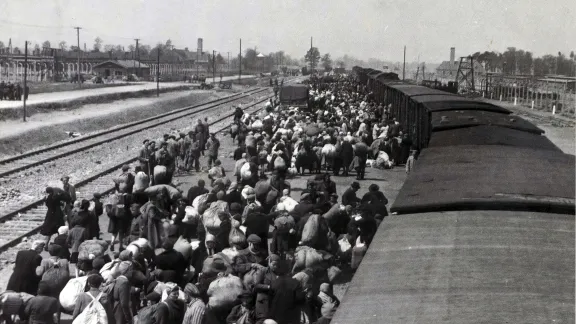
Deported Jews arrive at the concentration camp of Auschwitz / Birkenau / 1944. Credit: Fortepan / Lili Jacob
A reflection on asking forgiveness and the misuse of Christianity to spread hatred today
The deportation of Hungarian Jews started 75 years ago. Human beings, from infants to the elderly, were crowded into cattle cars heading for the gas chambers. The heat was overwhelming. Children were suffering from dehydration.
Reflecting on those crowded trains reminds me of a poem by Transylvanian poet, Domokos Szilágyi, entitled The Shadow of Death: “eight horses, or forty-eight people, or one hundred-and-fifty deportees.”
I recently met Éva Fahidi, a 93-year-old holocaust survivor. She was able to recall her story in detail. She lost her parents and an 11-year-old sister, as well as other family members. She also met Josef Mengele, the ‘angel of death’ in person. She remembers standing naked, with her head shaved, waiting for her fate to be fulfilled.
As I listen to her words, some biblical verses come to mind. Prophet Amos conveys the word of God this way:
“I will turn your religious festivals into mourning
and all your singing into weeping.
I will make all of you wear sackcloth
and shave your heads.
I will make that time like mourning for an only son
and the end of it like a bitter day” (Amos 8:10).
Or, as Jeremiah puts it: “Every head is shaved and every beard cut off; every hand is slashed and every waist is covered with sackcloth” (Jer 48:37).
Throughout history, the question put to Cain has repeatedly become relevant to new generations: “Where is your brother Abel?” And 75 years ago, a painfully large number of people answered: “Am I my brother’s keeper?” Even many people who regarded themselves as Christians, gave this answer – maybe in a spirit of protest, maybe in fear. Not many heard the warning by Lutheran pastor Dietrich Bonhoeffer: “Only someone who speaks out for the Jews has the right to sing Gregorian chant.”
The Holocaust did not start with the gas chambers, but with vulgar jokes, provocations and social exclusion. Sadly, we see today how people use the word ‘Christian’ to mean ‘anti-Jewish’ and how prayer and hatred may exist side by side in someone’s thoughts and heart.
We cannot pass over the events of 75 years ago without a comment. In confessing our sins, we might find inspiration in the Confiteor by – the since canonized – Pope John Paul II.
During the year 2000, he led a liturgy asking forgiveness for – as he put it – the most serious sins of the church, including the crusades, the inquisition, schisms, exclusion, religious intolerance, for sins against the Jews, for anti-Semitism in the past and for not speaking up during the Holocaust, for aggressive missionary work, for denying the human rights of people belonging to other religions and cultures, for sins committed by Christians against human dignity, especially against women, slaves and ethnic minorities (such as the Roma people), for not acting against social injustice, for not protecting the poor, the oppressed and the marginalized.
Seventy-five years on from the departure of those deadly trains, we only have the right to sing Gregorian chant, and look into the eyes of Éva Fahidi and her companions, if we too ask for forgiveness from all affected persons.
And if we too take a solemn vow not to misuse the term ‘Christian’ to stir up hatred and enmity anymore.
Presiding Bishop Dr Tamás Fabiny is head of the Evangelical Lutheran Church in Hungary.


